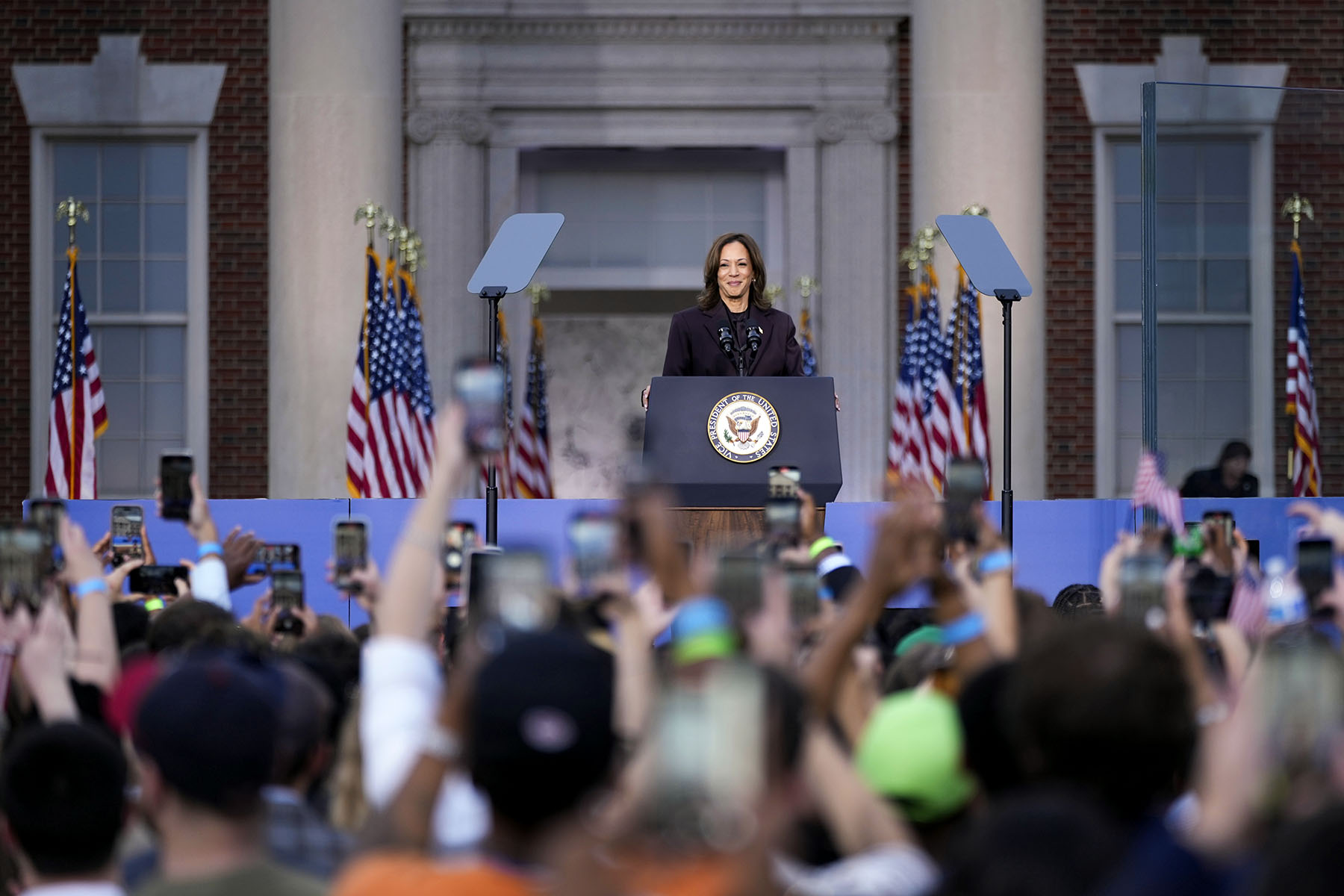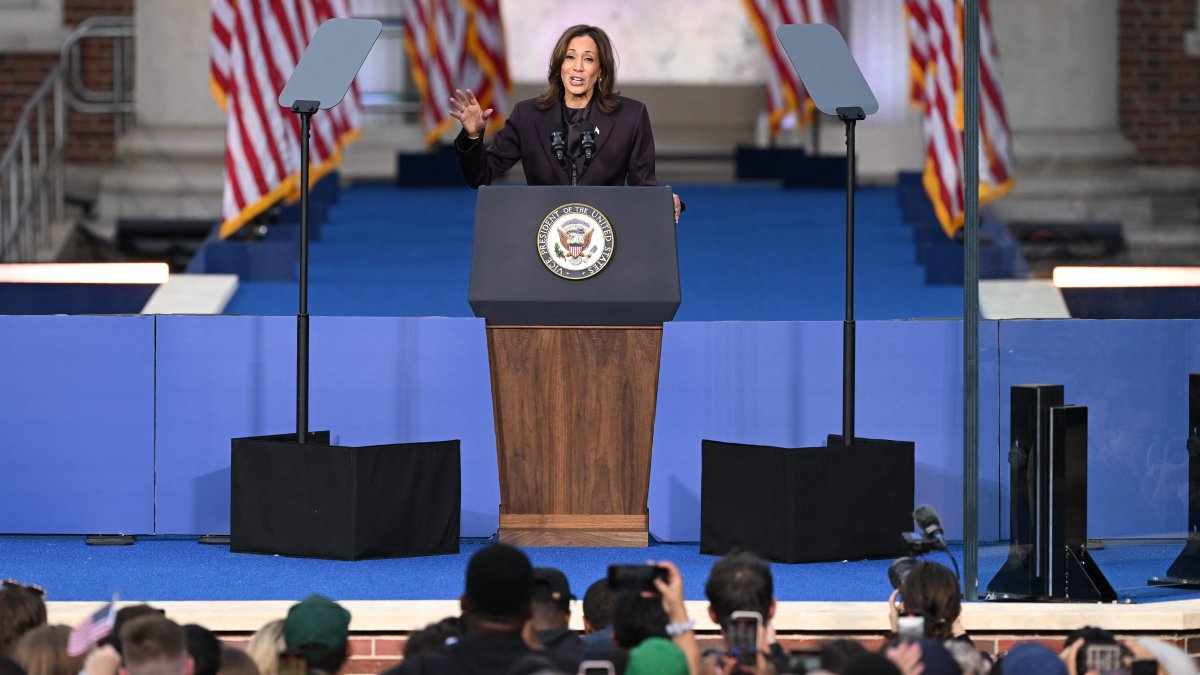Kamala Harris' Concession Speech: What You Need To Know
What does it truly mean to concede in the high-stakes arena of a presidential election, and what message does it send to a nation on the cusp of change? On Wednesday afternoon, at Howard University in Washington, D.C., Vice President Kamala Harris delivered a concession speech, a moment that underscored both the finality of the 2024 presidential election result and the enduring strength of democratic principles.
The air in the auditorium hung heavy with the weight of the moment. It was a moment of acknowledgment, a public acceptance of the outcome that had been decided at the ballot box. Following her loss to Republican opponent Donald Trump, Vice President Harris, standing before her alma mater, offered a speech that extended beyond the simple declaration of defeat. It was a call for unity, a plea for the preservation of democratic values, and a promise to continue the fight for the ideals she and her supporters held dear. The setting, Howard University, added another layer of significance to the occasion. It was not merely a backdrop, but a symbol of the Vice President's personal journey and the historical struggle for civil rights and equality. The choice of location amplified the message, reminding all present of the ongoing pursuit of freedom, opportunity, fairness, and the dignity of all people, ideals that Harris reiterated in her address.
Here's a closer look at Vice President Kamala Harris:
| Category | Details |
|---|---|
| Full Name | Kamala Devi Harris |
| Date of Birth | October 20, 1964 |
| Place of Birth | Oakland, California, U.S. |
| Education | Howard University (B.A.), University of California, Hastings College of the Law (J.D.) |
| Political Party | Democratic |
| Spouse | Douglas Emhoff |
| Previous Positions |
|
| Current Position | Vice President of the United States (2021-Present) |
| Key Policies/Positions |
|
| Notable Achievements |
|
| Official Website (Reference) | The White House - Vice President Kamala Harris |
The concession speech, a standard practice in American politics, holds significant weight. It is a formal acknowledgment of defeat, a gesture of respect for the democratic process, and a crucial element in the peaceful transition of power. It signifies that the election results are accepted and that the focus must now shift to the future, to the governance of the nation under the new administration. However, the speech delivered at Howard University was more than just a concession. It was a statement about the future, a call to action, and a reaffirmation of the values that Harris and her supporters believe in. It was a commitment to continue the fight, even in the face of defeat, for the causes she championed. Her address spoke of a fight for freedom, for opportunity, for fairness, and for the dignity of all people, echoing themes she had consistently emphasized throughout her political career.
The timing and location of the speech were also strategic. Wednesday's address, delivered at Howard University, a historically Black university, carried extra significance. It highlighted her long-standing connection to the institution and resonated with a key demographic that had been critical to her political success. The choice of venue also served as a reminder of the importance of education and the pursuit of knowledge, values that are central to the university's mission and Harris' own personal journey. Addressing the nation from this location sent a powerful message about the resilience of the community and the enduring commitment to progress.
The specifics of the speech were closely watched, as it was understood that the vice president's words would set the tone for the coming weeks and months. It was anticipated that she would urge unity, and that is exactly what she did. She emphasized the importance of working together, of bridging divides, and of finding common ground. This call for unity was essential, particularly in a political climate marked by deep divisions and intense partisanship. A peaceful transition of power demands respect for the democratic process, respect for the office of the presidency, and a commitment to the well-being of the nation as a whole.
The speech followed the announcement of the election results, a process that unfolded across the nation, highlighting the culmination of a long and often contentious campaign. The outcome, while decisive, was also a reminder of the deeply divided nature of the electorate. Millions of Americans had voted for Trump, and his victory presented a new set of challenges and opportunities for the nation. The task for the vice president, as she conceded, was not only to accept the result but also to prepare her supporters for the realities of a new administration. This meant acknowledging the loss, but also reminding them of their shared values and inspiring them to continue the fight for the causes they believe in.
The delivery of the speech itself was a study in political strategy. The tone was somber, reflecting the gravity of the moment, but also resolute. She spoke with a sense of purpose, reaffirming her commitment to the principles of democracy and the importance of civic engagement. In doing so, she aimed to inspire her supporters, reminding them that their fight was not over. The concession speech was an opportunity to set the stage for the coming months, to define her role in the opposition, and to offer a vision for the future.
The impact of the speech extended beyond the immediate audience. It was broadcast on national television and shared across social media platforms, reaching millions of Americans. The message resonated with a wide range of individuals, from long-time supporters to those who were still undecided about the outcome of the election. The speech served as a critical moment of reflection, a reminder of the principles that unite the nation, and an appeal for civility and respect. As a result, it became a cornerstone in the aftermath of the 2024 election.
The choice of Howard University as the setting was not accidental. It was a conscious decision to deliver the message in a place that held special meaning for both Harris and her supporters. The university's history, its mission, and its commitment to social justice made it an ideal venue. It was a place where students, faculty, and alumni gathered, creating a sense of community and shared purpose. The choice of location reinforced the core themes of the speech, emphasizing the importance of education, empowerment, and the pursuit of equality.
The themes of freedom, opportunity, fairness, and dignity echoed throughout the Vice President's address. These principles, she argued, were at the heart of the American experiment. The fight for these ideals was a constant one, a struggle that would continue regardless of the outcome of the election. It was a message of hope, a call to action, and a reminder that the pursuit of a more just and equitable society was a shared responsibility. It was this commitment to the fight that Harris wished to impart on those who listened.
In the context of the 2024 election, the concession speech had added weight. The election had been particularly divisive, and the nation faced a range of complex challenges, from economic inequality to climate change. The vice presidents words provided a sense of perspective, reminding the public that the democratic process, though imperfect, was the best way to resolve differences and move forward. Her speech was a call for unity, urging all citizens to participate in the governance of the nation. In the wake of the election, unity was seen as crucial for the peaceful transition of power and the stability of the country.
The political landscape will undoubtedly shift following the election, with new priorities and challenges emerging. The concession speech by the Vice President set the stage for these changes. Her message was one of acceptance, but also of continued engagement. It was an acknowledgement of the election results, and a promise to continue working towards the ideals she had always represented. The speech, in essence, was a bridge to the future. It was a declaration of resilience, determination, and an unwavering belief in the power of democracy and its principles.
The speech was a reflection of the political climate as well as a guide for the future. The Vice President's address served as a reminder of the values that bind the nation together. It underscored the necessity of respecting democratic processes and a peaceful transfer of power. At Howard University, the speech was delivered, offering a reminder of the ongoing commitment to the fight for freedom, opportunity, fairness, and the dignity of all people, which will continue to shape the course of the nation for years to come.

Read Kamala Harris' concession speech transcript at Howard University

When will Kamala Harris give her concession speech? NBC10 Philadelphia

Harris to critique Trump at Emerge gala